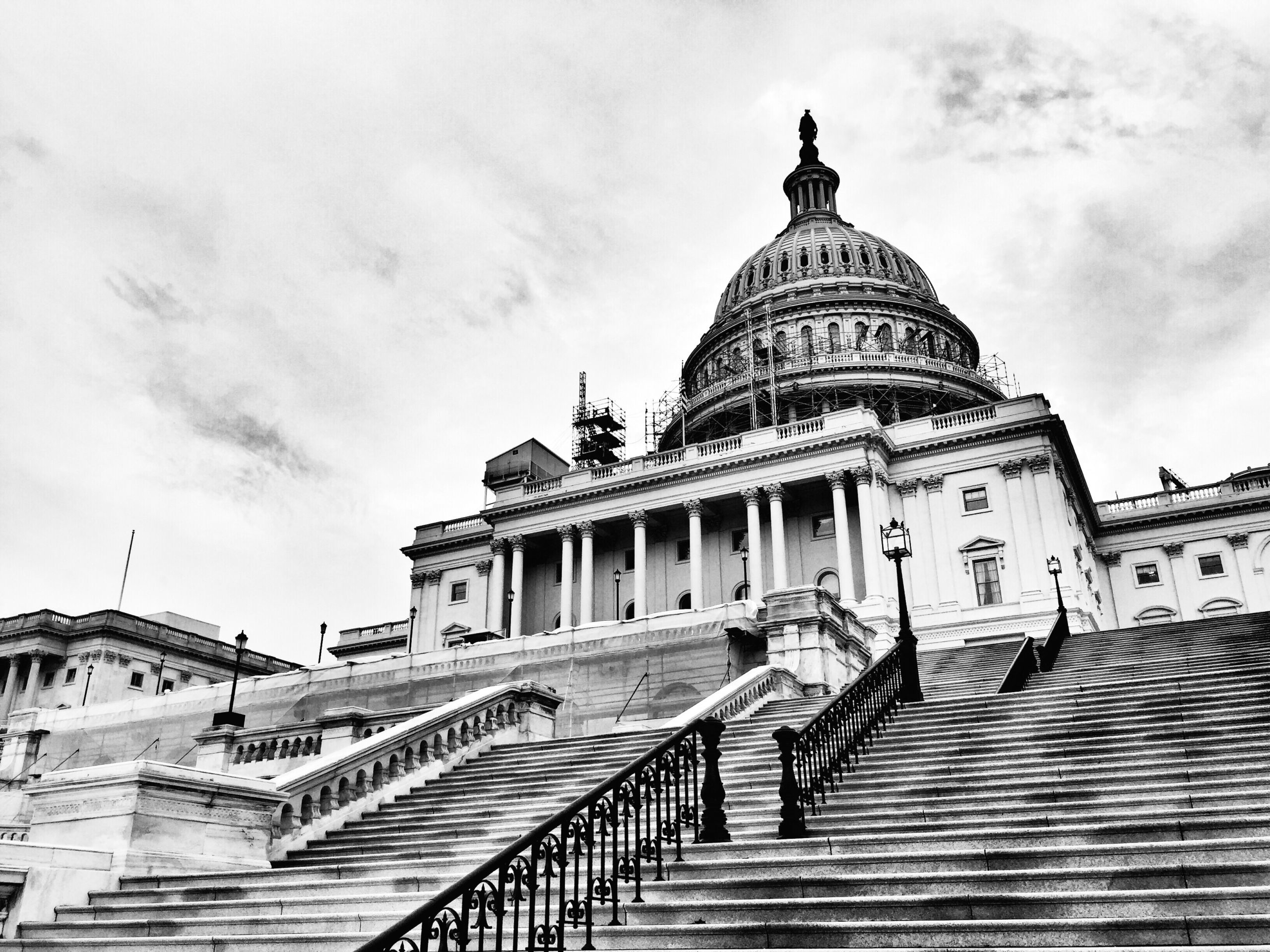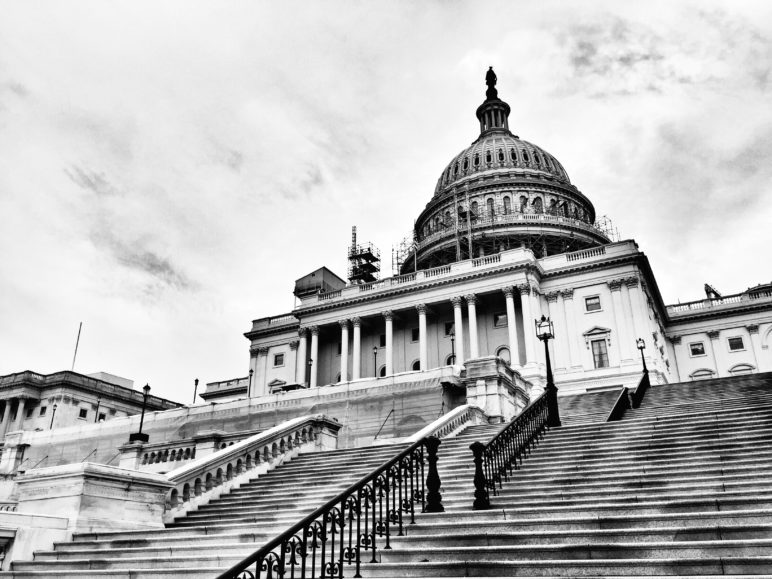They say you have to hit rock bottom to begin your path to true recovery. This week’s attack by partisan extremists on the country’s Capitol, attempting to use force to overturn a democratic election was a record low for democracy in the United States. Can this dark moment unite Americans around critical election reforms?
As others have noted, what we witnessed on Wednesday was not only the violent culmination of the most recent barrage of false election claims and partisan incitements from the highest offices, but also one dangerous result of years of deliberate, calculated erosion of American institutions and Americans’ trust in them.
Like the barricades around the Capitol building that were so easily breached, US democracy’s defenses are down.

Like the barricades around the Capitol building that were so easily breached, US democracy’s defenses are down. Rioters, and president Trump, saw the idiosyncrasies of the Electoral College system and the patchwork of state rules for elections as faultlines to exploit. At every archaic stage of the Electoral College process, they grabbed a chance to sow doubt and chaos, from the timing of vote releases in November to the electors’ votes in December to the Congressional certification in January. From intimidating secretaries of state, twisting state legislators’ arms, challenging certified and audited vote counts in specific counties and swing states where voters hold outsized Electoral College power, or finally, literally breaking the windows of Congress, they tried to subvert the legitimate will of We the People. The very complexity of the Electoral College system aided Trump and his adherents in casting doubt in many Americans’ minds on an otherwise decisive win by the Biden-Harris ticket.
America’s antiquated voting methods surely contributed to shockingly sanguine responses from Republican party leaders as well. Anyone gerrymandered safely in a red district had no motivation to speak out against illegal actions that a portion of their base backed. Any office holder living in fear of being outflanked in their next primary by a farther-right candidate had reason to keep mum as well. And state election laws that disproportionately disenfranchise Black and Latino voters buffer lawmakers from true accountability to all their constituents. These flawed systems—gerrymandering, party primaries, voter suppression—played a part in handing elected officials a pass to shrug it off rather than take a stand for US democracy.
But as we reel from the events of the week, it’s worth remembering that the November 2020 elections, held in the face of compounding challenges posed by lies, lockdowns, postal disruptions, and pandemic fears, can be chalked up as a success for voter participation. Voters turned out in record numbers, rallied by massive, long-term organizing and mobilization strategies, and, in many key places, fired up by calls for racial justice that swept the country in 2020. Across the country, elections officials carried out safe, secure, well-orchestrated early, absentee, and in-person voting, and conducted swift, accurate counts.
There are some election reforms immediately at hand to shore up democracy going forward, solutions that we can implement with bipartisan support.

It’s worth remembering now too that though the information chasm driving some of our partisan differences is hard to bridge, there are some election reforms immediately at hand to shore up democracy going forward, solutions that we can implement with bipartisan support.
Red Alaska just approved ranked choice voting, freeing its candidates from the fear of being “primaried” and opening them up to principled positions they believe the average Alaskan will appreciate. The effect is immediately visible, as Alaska Senator Lisa Murkowski speaks out against the insurgents and declares she will not be held hostage by a party that doesn’t respect the Constitution and the rule of law. In Georgia, a Republican Secretary of State implemented Automatic Voter Registration in 2016, which added more than a million new voters to the rolls by 2020. And another Republican Secretary of State mailed absentee ballot applications to all registered voters to ensure they had the option to safely vote from home during the pandemic. The number of absentee voters soared from 6 percent to 26 percent, indicating that election officials’ efforts helped a million voters participate who might not have done so if they had to show up in person during a pandemic.
These are successes to build on and hopeful reminders that from the beginning US democracy has been an aspirational experiment, deeply flawed but a work in progress, and that its evolution toward a more perfect ideal counts on our unrelenting work to improve it. Many times Americans have come together as a country to enact reforms that expanded voting rights, often driven by crisis and by the hard work of the most marginalized.
We have the tools to build US democracy back better, and to mend the cracks that have been pried open by subversion. Ranked Choice Voting and Automatic Voter Registration are two of the road-tested, common-sense solutions described in our new book, Becoming a Democracy. And we propose a four priority election reforms for Congress to tackle in their first 100 days, here. The division, doubt, and license to destruction on display on January 6 showed us that it is more urgent than ever to spread these democracy solutions to every state and change the dynamics that allowed elected officials to look the other way as sedition played out in the halls of the Capitol.
Sightline Institute is a 501(c)3 non-profit organization and does not support, endorse, or oppose any candidate or political party.













Bliss Moore
I highly respect and appreciate the great work Sightline does in supporting the need to save our natural environment. I hope you will continue your work for social justice (i.e., for minorities, the homeless, poor and needy). Your work toward exposure of governmental weaknesses and recommendations for repairs to our democracy, such as, fairly redistricting WA for all or voters, is extremely important. Also, Mail-in Ballots must continue to provide fairness for all voters. The Sierra Club” Tatoosh Group” (Pierce County) would love to help promote attendance to your Great Public Presentations in the Greater Tacoma area.